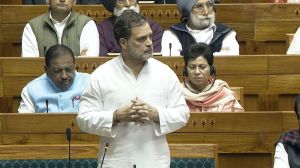Memogate unleashes storm in Pak
Mullen confirms receiving memo which promises to allow US to target Qaeda militants
The storm raging in Pakistan over a secret memo seeking US help for the civilian government to defang the army escalated after the Pakistani-born American businessman at the centre of the controversy said he had delivered the memo to USs top military official at the behest of Islamabads ambassador to Washington,Hussain Haqqani.
The matter has brought into sharp relief the tensions between the government and the so-called establishment in Pakistan,and threatens not just Haqqani but,perhaps,President Asif Ali Zardari as well.
The target is not me,the target is President Zardari and Pakistani democracy, said Haqqani,who has denied all the charges levelled by the businessman,Mansoor Ijaz,and on Thursday offered to resign.
Also on Thursday,Adm. Mike Mullen,former chairman of the US Joint Chiefs of Staff,confirmed that he had indeed received a memo of the kind described by Ijaz something that he had earlier denied.
The controversy erupted on October 10,after Ijaz wrote an op-ed article in The Financial Times,claiming he had been an informal conduit for a secret memo delivered to Mullen a few days after the May 2 US raid that killed Osama bin Laden in Abbottabad.
Zardari,Ijaz wrote,felt he needed an American fist on army chief Gen. Ashfaq Parvez Kayanis desk so that he is dissuaded from attempting a coup in the days following the raid,which left the army humiliated and deeply embarrassed. The alleged memo,which was published by Foreign Policy magazines The Cable blog Thursday,asked for Mullens help to install a new security team in Islamabad that would be friendly to Washington.
The unsigned memo,which The Cable said was authentic and had been received by Mullen,has potential to fuel politically toxic charges that the government is colluding with the US against the interests of Pakistan and its army.
The memo promises to allow the US to name officials to investigate Osamas presence in Pakistan,facilitate US attempts to target militants like Ayman al-Zawahri and Mullah Omar and allow the US greater oversight of Pakistans nuclear weapons.
In interviews to Dawn,FT and several other publications Thursday and Friday,Ijaz confirmed speculation that Haqqani was the Pakistani diplomat behind the memo. He also told Dawn that he wrote his original October 10 column in FT to defend Mullens criticism of Pakistans alleged support for Islamist militants.
Pakistans The News printed what it said were transcripts of BlackBerry messenger conversations between Haqqani and Ijaz,apparently showing the men discussing the wording of the memo.
Ball is in play now. Make sure you have protected your flanks, Ijaz allegedly tells Haqqani after handing over the memo.
At a stormy session of the National Assembly Friday,Prime Minister Yousuf Raza Gilani assured lawmakers that rumours arising out of the memogate scandal about the break-up of Pakistan and the dissolution of national institutions were baseless.
We have already taken action. What do you suggest that we should do now? Counter-reactions,actions and blame game will not work. We have to go forward, Gilani said,ruling out any change in government through unconstitutional and undemocratic means. Haqqani is a key conduit between the US and Pakistan countries that mistrust but need each other. If Haqqani does leave his post,we will have lost our most effective lobbyist for the country, said The Express Tribune.
Haqqani asked me to deliver memo
Mansoor Ijaz,a Pakistani-American businessman,told Dawn it was Ambassador Husain Haqqani who asked him to deliver a memo to the then US military chief Adm Mike Mullen after the US raid that killed Osama.
Dawn: The Washington Post quoted you as saying Haqqani orchestrated denial of the memo and then interpreted your quote as indirectly identifying Haqqani as the official who gave it to you. Is this correct?
Mansoor Ijaz: Yes,Amb Husain Haqqani was the senior Pakistani diplomat who asked me to assist him in delivering his message to Adm Mullen. I have evidence in Blackberry messages that he orchestrated denials from each official body that mattered. When the Foreign Office denial didnt work,he tried the presidency with a stronger rebuttal. When that didnt work,he got an unsuspecting Mullen to deny. Mullen went back and checked and duly issued a clarification. Obviously,there were a lot of people in Pakistan the army chief,the ISI chief and the prime minister whom he did not take into confidence on this matter.
Dawn: Did Haqqani draft the memo? Did you also help draft it?
Mansoor Ijaz: Haqqani was entirely responsible to the last word for the content of the memo. The agreement we made was that he would talk and I would type. That arrangement gave him plausible deniability and I was willing to take the heat if it went wrong. Today,with the magnitude of lies your government was willing to tell … or perhaps just out of sheer ignorance … in its statements,I decided to air the entire set of facts.
Dawn: It was obviously a secret mission. Why did you go public? Why did you write that op-ed for FT?
Mansoor Ijaz: Mullen served our country honourably for 43 years. When he testified in the Senate armed services committee about ISI malfeasance in attacks on US and Nato interests in the region,your press lambasted him and made his engagement with Pakistan he was probably your countrys truest friend in US a joke. I did not accept that Pakistans press would assassinate Mullens reputation for his comments about the duplicities in Pakistans policies. Thats why I wrote the op-ed.
When Haqqani called me after the piece was published,his only concern was it would lead to identifying him as the author of the memo. He asked me who were the other senior people I knew in Pakistan so he could put the press off. The timing of the op-ed piece was simply set after the hearings in which Mullen appeared on September 22.
Dawn: Why did President Zardari and Haqqani send a memo on such a sensitive subject? Why did they not send an oral message?
Mansoor Ijaz: It was their intent to do all of this verbally. But my US interlocutor who sent the memo to Adm Mullen insisted on having the ambassadors offers in writing because the US had been repeatedly deceived by Pakistans verbal offers in the past. He also insisted I obtain the ambassadors assurance that President Zardari had approved the offers contained in the memorandum. I did exactly those two things.
Dawn: Was it just one Pakistani official or someone else also involved?
Mansoor Ijaz: Only Haqqani. He told me that others were with him in Pakistan on this,but never really mentioned names other than that of the boss.
- 01
- 02
- 03
- 04
- 05































